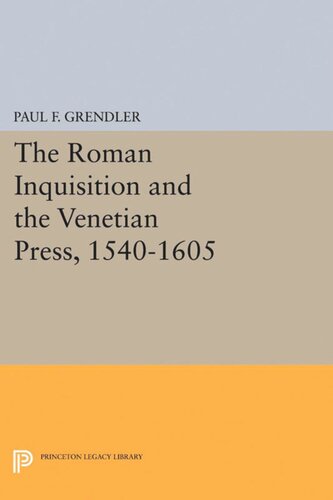

Most ebook files are in PDF format, so you can easily read them using various software such as Foxit Reader or directly on the Google Chrome browser.
Some ebook files are released by publishers in other formats such as .awz, .mobi, .epub, .fb2, etc. You may need to install specific software to read these formats on mobile/PC, such as Calibre.
Please read the tutorial at this link: https://ebookbell.com/faq
We offer FREE conversion to the popular formats you request; however, this may take some time. Therefore, right after payment, please email us, and we will try to provide the service as quickly as possible.
For some exceptional file formats or broken links (if any), please refrain from opening any disputes. Instead, email us first, and we will try to assist within a maximum of 6 hours.
EbookBell Team

5.0
90 reviewsOne of the great European publishing centers, Venice produced half or more of all books printed in Italy during the sixteenth-century. Drawing on the records of the Venetian Inquisition, which survive almost complete, Paul F. Grendler considers the effectiveness of censorship imposed on the Venetian press by the Index of Prohibited Books and enforced by the Inquisition.
Using Venetian governmental records, papal documents in the Vatican Archive and Library, and the books themselves, Professor Grendler traces the controversies as the patriciate debated whether to enforce the Index or to support the disobedient members of the book trade. He investigates the practical consequences of the Index to printer and reader, noble and prelate.
Heretics, clergymen, smugglers, nobles, and printers recognized the importance of the press and pursued their own goals for it. The Venetian leaders carefully weighed the conflicting interests, altering their stance to accommodate constantly shifting religious, political, and economic situations. The author shows how disputes over censorship and other press matters contributed to the tension between the papacy and the Republic. He draws on Venetian governmental records, papal documents in the Vatican Library, and the books themselves.
Originally published in 1977.
The Princeton Legacy Library uses the latest print-on-demand technology to again make available previously out-of-print books from the distinguished backlist of Princeton University Press. These editions preserve the original texts of these important books while presenting them in durable paperback and hardcover editions. The goal of the Princeton Legacy Library is to vastly increase access to the rich scholarly heritage found in the thousands of books published by Princeton University Press since its founding in 1905.